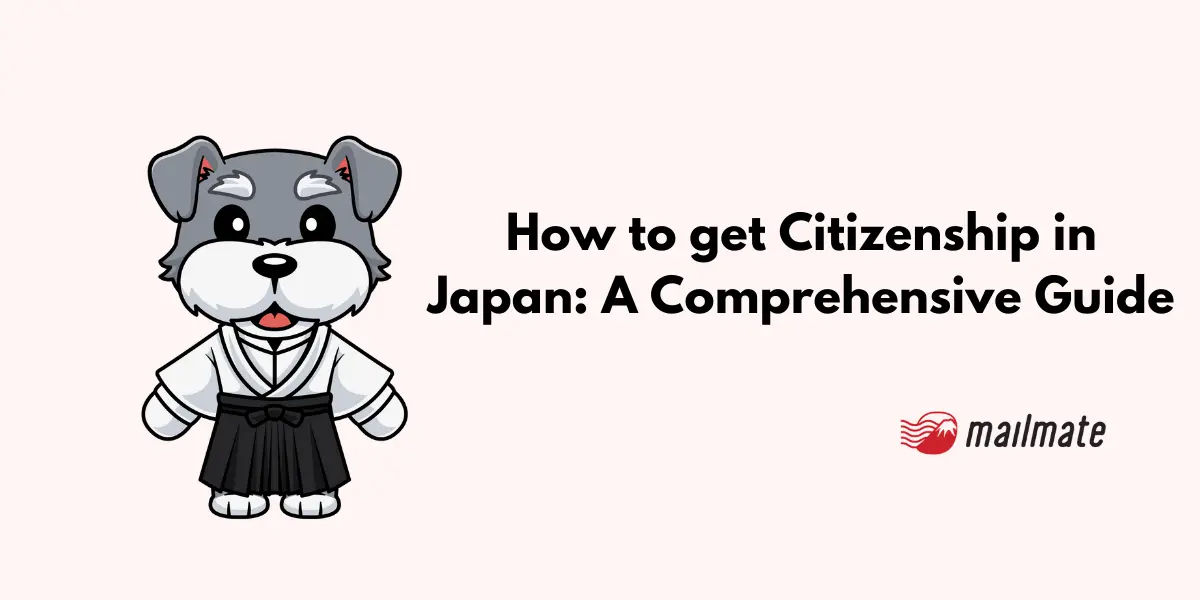How to get Citizenship in Japan: A Comprehensive Guide

Taking the step to become a Japanese citizen is a life-changing experience.
However, navigating Japan's naturalization process can be quite troublesome. So, we've created this guide to help.
It will provide an overview of the requirements, steps, and important considerations for obtaining Japanese citizenship.
Let's learn how to get citizenship in Japan.
Please visit the Japan Ministry of Justice for details about Japanese citizenship here.
Can a foreigner get citizenship in Japan?

From Discover Nikkei
Foreign nationals in Japan obtain Japanese citizenship through naturalization. The general requirements for Japanese naturalization are as follows:
Maintain continuous residence in Japan for more than 5 years
The person is at least the age of 20
There are other requirements, which will be covered a little later.
Is it difficult to get Japanese citizenship?
Obtaining Japanese citizenship is not necessarily difficult, but it can be a long process involving document gathering, filling out forms, and waiting for results.
What do you get when you become a Japanese citizen?
The two main reasons people will become Japanese citizens are to obtain a Japanese passport and be able to vote in Japan.
The Japanese passport is known to be one of the strongest in the world. It allows travelers to travel to over 190 visa-free countries, making it one of the incentives to become a Japanese citizen if you have a weaker passport with less visa-free travel.
Additionally, if you are already living in Japan and are staying for the long term, such as for retirement, being able to vote allows you to have a voice in your local government.
Permanent residency vs citizenship in Japan
Both PR in Japan and citizenship allow foreigners to live in Japan permanently.
However, the main difference is that the former allows you to keep your other citizenships in other countries, while the latter requires you to have only Japanese citizenship.
Additionally, the process for each is slightly different. You do not need to know Japanese or undergo an interview when applying for PR.
4 points to know about Japanese citizenship
There are 4 key points to know when you become a Japanese citizen:
No dual citizenship: The Japanese government does not allow dual citizenship. Applicants will need to renounce their previous nationality.
Residency requirement: You have lived in Japan for at least 5 continuous years.
Legal and financial stability: Good conduct, stable income, and financial assets to support yourself.
Language proficiency: There is no explicit language requirement, but having basic or conversational knowledge will help you through the process.
How to get citizenship in Japan
Here, we go over how to get Japanese citizenship.
Japanese citizenship requirements
Surprisingly, becoming a Japanese citizen requires fewer requirements than a permanent residency in Japan.
To acquire Japanese nationality, you will need to:
Continuous has lived in Japan for more than 5 years
Must be over 20 years old
Have a good moral character
Demonstrate financial independence
Agree only to hold Japanese citizenship
Respect the Japanese Constitution
Additionally, a child can hold Japanese nationality if one of their birth parents was a Japanese national. They can retain Japanese nationality and be granted citizenship by age 22. Afterward, they will need to decide which citizenship they will have.
Steps to acquire Japanese citizenship
Step 1: Contract your local Legal Affairs Bureau
Make a reservation for an interview date. They will then review your case for naturalization in Japan.
If there is a high chance of Japanese naturalization, they will tell you the documents you need.
Step 2. Submit the required documents
You will need to prepare:
Application for Naturalization Permission (with a 5cm x 5cm photograph of the applicant)
Documents describing general information about relatives
Written purpose statement for naturalization
Resume
Documents of your finances
Documents of your business activities
Copy of residence certificate (住民票, juminhyo)
Documents that prove your nationality
Documents that prove the relationship with your parents
Documents that prove tax payment
Documents that prove income
Documents that prove residence history
Some documents will be from Japan, while others will be from your home country. So, gathering these documents is the most tedious part when applying for Japanese citizenship.
Additionally, any documents that are not in Japanese will need a translation.
Your caseworker will give you all the details to ensure your application succeeds.
Step 3. Interview
It will take about 2 months for your application to be accepted.
Once so, you will go through an interview process to verify you are the person who submitted their documents such as:
Why did you come to Japan?
Why do you want to become Japanese?
Can you explain in detail what you do for work?
What are your plans for when your parents age and need care?
Depending on the bureau, the interviewer will also state whether they need to do a home visit.
Step 4. Review
More waiting!
At this step, your naturalization application will be sent to the Minister of Justice, where everything will be examined more closely.
If necessary, they will contact you for any additional documents.
Additionally, you will need to contact the number provided if your contact information, civil status, employment, etc., has changed.
It can take over 6-10 months to hear the results of this step.
Step 5: Approval and naturalization ceremony
Once you get your approval, you are now a Japanese citizen.
There's a little ceremony, and you'll receive some papers to submit to your city office, where you can create a new koseki with your new status. Then you're done.
Well, sort of.
You'll need to update your name and nationality on everything you're registered with, such as your bank account.
Is dual citizenship allowed in Japan?
According to the Japanese Nationality Act, dual citizenship. So, you will need to renounce your previous citizenship to receive a Japanese one. Even if your home country does allow it, you must comply with Japan's requirement to obtain Japanese nationality.
Alternatives to becoming a Japanese citizen
While nothing compares to having Japanese citizenship, some alternatives are similar to having one.
a) Permanent residency: Long-term living in Japan
When you have PR in Japan, you can live and work there without changing your citizenship.
PR in Japan still has its caveats, such as:
You will not receive a Japanese passport
You can not vote in local elections
You have to have a special re-entry form when leaving Japan temporarily
Additionally, you will need to renew your PR card every 7 years.
b) Business manager visa: Japan citizenship by investment
Other countries, such as Antigua & Barbuda and Austria, allow citizenship by investment, which is when an individual makes investments that benefit the country economically, such as starting a business or making a donation to public projects.
At this time, Japan citizenship through investment does not exist. However, you can become a Japanese resident with an investor visa or a business manager visa. With these visas, you can establish and manage a business in Japan during the visa validity.
When you stay in Japan for long enough, you can be eligible to gain Japanese citizenship or PR in Japan.
Frequently asked questions
Does marrying a Japanese give citizenship?
No. When you marry in Japan, you will be given a spousal visa sponsored by your Japanese spouse. To get Japanese citizenship through marriage, you still need to go through the Japanese citizen requirements of living in Japan for more than 5 consecutive years, being over 20 years old, having financial independence, and agreeing to hold only Japanese citizenship.
Do you have to speak Japanese to become a citizen?
While not a legal requirement, knowing Japanese will help you fully understand the process and requirements for the naturalization process.
Will I lose my US citizenship if I become a citizen of Japan?
While US laws allow dual citizenship, Japan only allows its citizens to hold only Japanese citizenship. Therefore, you will lose your US citizenship when you become a citizen of Japan.
Does Japan allow dual citizenship with the US?
Japanese law prohibits its citizens from having multiple nationalities and citizenships from multiple countries, including the US. So, when someone applies for Japanese citizenship, they will relinquish their previous foreign nationality. And vice versa. When a Japanese national becomes a citizen elsewhere, they will relinquish their Japanese citizenship.
In closing
Now you know how to get citizenship in Japan. While Japan does not allow dual citizenship, having Japanese citizenship allows you to have a stable and long-term option to live and work in Japan, along with a strong passport to travel and the ability to vote.
For further details, consult the Japan Ministry of Justice.
Spending too long figuring out your Japanese mail?
Virtual mail + translation services start at 3800 per month. 30-day money-back guarantee.

